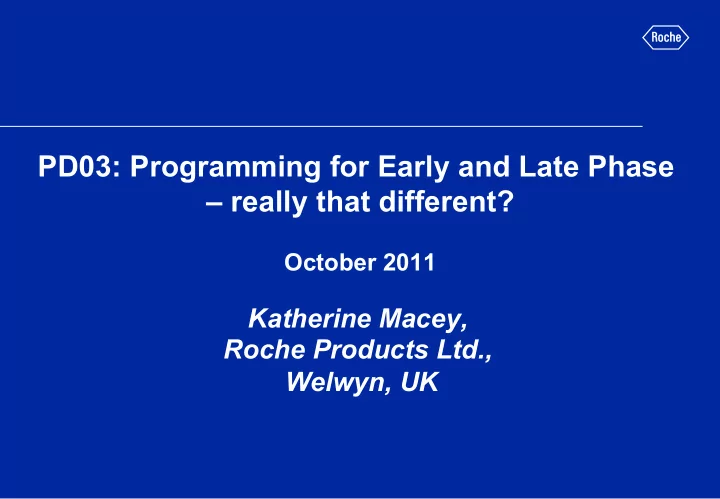

PD03: Programming for Early and Late Phase – really that different? October 2011 Katherine Macey, Roche Products Ltd., Welwyn, UK
Agenda • Question: “ Programming for Early and Late Phase – really that different? ” • To try and answer this question, I will consider: – Typical studies across the phases (QUIZ!) – Technical and ‘ soft ’ skills required from programmers – Possible options for organising teams across the phases – Conclusions – Questions
Typical studies across the phases Quiz Phase I, II or III? • Example 1 : Study in patients, ~400 patients with depression, randomized (drug at 3 dose levels or placebo as adjuvant therapy), Bayesian interim futility analysis to drop ineffective arms, DMC (data monitoring committee), double-blind, multi-centre, study length ~19 months, efficacy, safety, PK, PD, exploratory endpoints • Phase II (A) • Example 2 : Study in patients with acute coronary syndrome, ~300 patients, randomized (drug at one dose level or placebo added to usual care), double- blind, multi-centre, study length ~10 months, efficacy, safety • Phase III
Typical studies across the phases Quiz Phase I, II or III? • Example 3 : Study in healthy volunteers, 64 subjects in 8 cohorts, single centre, single-blind, randomized (6:2 per cohort), study length ~11 months, safety, tolerability, PK, PD, exploratory endpoints. Includes objectives to evaluate effect of food, activated charcoal, formulation, i.v. microdose of drug • Phase I • Example 4 : Study in patients with RRMS (relapsing remitting multiple sclerosis), ~200 patients, dose ranging, randomized (drug at two dose levels or placebo added to usual care), partially-blind, multi-centre, study length ~> 3 years, efficacy including MRI scans, safety • Phase II (B)
Typical studies – early phase Build on phase I Exploratory knowledge Adaptive Small nos. designs, IA, 100-300 Quick healthy exploratory patients turnaround volunteers analyses Phase Phase IIA I First indication of PK, PD, May be Exploratory efficacy safety, multicentre endpoints (POC) or tolerability Further POM evaluate Adjustments safety, dose to cohorts, ranging, objectives dose response
Typical studies – late phase Confirm- Well atory controlled Less scope Doses Conducted for changes selected in larger Large nos. during patients from phase patient study IIA populations Phase Phase III IIB Rigorous Confirm demon- Global, efficacy and Multicentre multicentre safety in stration large popn. of efficacy Comparative May be to other pivotal treatments
Agenda - progress • Question: “ Programming for Early and Late Phase – really that different? ” • To try and answer this question, I will consider: – Typical studies across the phases (QUIZ!) √ – Technical and ‘ soft ’ skills required from programmers – Possible options for organising teams across the phases – Conclusions – Questions?
Technical Skills: early vs. late Study designs / Programming therapeutic efficiency / area / data consistency / knowledge strategy QC and Submission / specifications filing preparation Graphics
Soft Skills: early vs. late Team working Planning Communication Organisational skills Flexibility
Agenda - progress • Question: “ Programming for Early and Late Phase – really that different? ” • To try and answer this question, I will consider: – Typical studies across the phases (QUIZ!) √ – Technical and ‘ soft ’ skills required from programmers √ – Possible options for organising teams across the phases – Conclusions – Questions?
Organising teams • Many factors may influence how programming teams can be organised • Some options: ‘Separate early / ‘Everyone does late phase everything’ ‘Something in between’: Safety group, HV group
Organising teams ‘Separate early/late phase’ ‘Everyone does everything’ Pros Cons Pros Cons • Efficiency • Consistency • Consistent • Inefficiencies gains approach • Comms early • Unlikely to • Opportunities <-> late phase • Flexibility of follow project resources • Reflects • Line early / • Start of project = different needs late arbitrary • Comms phase I • Mirrors • Oncology/pts • Follow the organisations project
Example from Roche SPA pRED SPA supporting pRED ED SPA gRED SPA supporting gRED SPA supporting PD PD
Agenda - progress • Question: “ Programming for Early and Late Phase – really that different? ” • To try and answer this question, I will consider: – Typical studies across the phases (QUIZ!) √ – Technical and ‘ soft ’ skills required from programmers √ – Possible options for organising teams across the phases √ – Conclusions – Questions?
Conclusions • Question: “ Programming for Early and Late Phase – really that different? ” • Answer YES : different objectives, speed, focus, data types, standard programming, QC strategy, documentation and forward-thinking required • … .but also NO : both need flexible programmers with good programming skills, knowledge and communication skills, but perhaps in different areas and with different partners • Questions?
We Innovate Healthcare
Recommend
More recommend